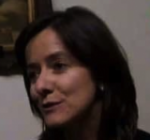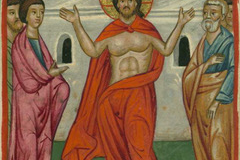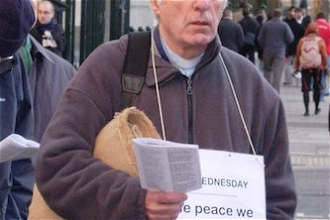Vatican: seminar examines role of women in Church and society

Ana Villa Betancourt
The Women’s Section of the Pontifical Council for the Laity began a study seminar in Rome on Thursday on the theme: 'God entrusts the human being to the Woman', drawn from Blessed Pope John Paul II’s Apostolic Letter Mulieris dignitatem (MD). The two-day seminar was planned to coincide with the 25th anniversary of this document, which highlights the central role, dignity and vocation of women in the Church and society. Over these two days, dozens of experts working in academia and in practical projects in the field will be re-examining the impact and relevancy of the document 25 years on.
Ana Cristina Villa Betancourt, a young lay woman from Colombia, is head of the Council’s Women’s Section. She says she wants the seminar “to become a melting pot of ideas to help us make an analysis of what has happened and what needs to be done: What are the new challenges and the new themes that should be (studied further) in this area?” “People are not here to learn but to share.”
Mulieris dignitatem, she stresses, has had a significant impact in the life of the Church over the past quarter century.
In her interview withTracey McClure on Vatican Radio, Ana explained that “it was the first document of the magisterium entirely dedicated to the questions of women’s dignity and vocation. There had been interventions before where popes had spoken to groups of women and said many beautiful things but it was (quite remarkable) that a whole apostolic letter was written on the issue. I think quite interesting also is the history of this document because this document comes just less than a year after the Synod for the Laity that took place in 1987. And at that synod, a lot of questions on the role of women in the Church came out and John Paul II was there listening to the questions of the bishops, and even one of the requests of the synod was that any changes that would happen in the work of women in the Church should be rooted in a deep theology and anthropology.”
Mulieris dignitatem (August 15, 1988) she points out, was published a few months before the post-synodal exhortation Christifidelis laici (December 30, 1988) . “But it was a fruit of the Synod of the Laity,” she emphasizes.
Ana describes MD as an important document that has marked an era within the Church. She said Many reflections have come out of it and many projects are inspired by it.
She says more can be done to make the document more widely known and implemented in the Church. What has been accomplished thus far, she notes, is “not enough.” “We are not happy, satisfied that everything written there has been fully lived.”
That’s why the Council for the Laity is trying to “re-propose it.”
Throughout the years, Mulieris dignitatum has undergone some criticism for “not having gone far enough” to promote the role of women in the Church and society. Asked if the document retains its relevancy 25 years on, Villa Betancourt said: “I think it is very relevant because it very much goes to the foundations. Maybe it’s not so much a practical document and so maybe some people were a bit frustrated by it because they were expecting practical indications to come from it. But I don’t think that was…the aim. The aim was to give foundations, precisely, to help people in their practical lives. But it needs to be lived and so many of the frustrations (stem from the fact) that it hasn’t been lived enough.”
Villa Betancourt says Christifideles laici calls us to put into practice the teachings of Mulieris dignitatem. “It’s interesting because we see many frustrations today and we wonder if it’s because (the possibilities given by these documents) haven’t been enacted enough.”
Asked where in the Church could women be given more spaces? Villa Betancourt answers: “anywhere the leadership of the laity could be encouraged.”
The Church, she says, “has to be guided by different logic, not a logic of authority and power but of service. (In this) area, the role of women is essential, very, very important ….I think there are many spaces where – well, any space where the leadership of the laity could be encouraged. And where you don’t need the sacred orders to be present, the presence of women could be very strong.”
Pope Francis has recently spoken of the need to place the laity in positions of responsibility within the Church. “It can be very enriching for clerics to work with laity – men and women,” says Villa Betancourt. ".... that was a calling not only from Christifedelis laici but even before... the Second Vatican Council."
So we know that sometimes things in the Church take time and revolutions don’t happen overnight, but we need to keep, I think, encouraging things in this direction.”
In their press release announcing this week’s seminar, the Women’s Section draws attention to the “urgent” need to put these things into practice.
“Maybe one of the reasons (for the urgency) is the reason why we chose the phrase we chose for the title of the seminar: a phrase from MD where Pope John Paul says that ‘God entrusts the human being in a special way to the woman.’ Even though he clarifies that: every human being is entrusted to each and every one (of us). We are all responsible for one another. But this entrustment in a way, touches the woman in a special way,” Villa Betancourt explains.
“There is a huge anthropological crisis that we can see in many painful manifestations – even as we turn on the TV or walk down the street. Then there is this urgency to be custodians of one another like Pope Francis has always been saying. But then, there is this special entrustment of the human being to the woman and this (is) maybe (a) plus: that women can give in society, in the Church, wherever they’re present. So, we are trying to ask ourselves this question.”
“Women are now present in every space of society, of social life, political life, economic life, and it’s great that it’s happening like that,” says Villa Betancourt. “But what else can they give? What contribution can they make now that they are present (in these places) to help reverse this anthropological crisis of our times? Because, if it’s true that God entrusts the human being to the woman, she can do more. She can do something. And maybe, if she’s aware of (this) special gift … she can be more present and more incisive in intervening in different ways to change things for the better.”
Source: Vatican Radio/VIS


















